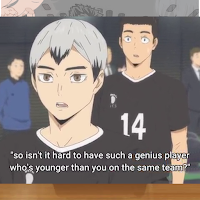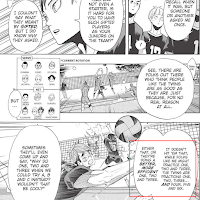Haikyuu!!: Redefining Talent Through Oikawa and Kageyama
This analysis uses a third-person point of view, not Oikawa’s.
Setting skill and being a setter are not the same thing.
Even a four-hour breakdown wouldn't be enough to define a player's “setter-ness.”
We're evaluating them as volleyball players, not as setters.
Part 1: Early Development and the “Head Start”
When did they start playing volleyball?
 |
| Kageyama at three years old, Oikawa isn't stated |
Kageyama began as early as 3 years old.
Oikawa’s starting age isn’t stated, but…
We know from his conversation with Coach José Blanco that he didn’t take volleyball seriously until middle school. It’s implied that during elementary school, it was more of a casual hobby.
By 2nd grade, Kageyama was already receiving proper training, likely through a dedicated training center. Oikawa, on the other hand, only began structured training during his first year of middle school, meaning Kageyama had a 3-year head start.
 |
| Kageyama started in 2nd grade, Oikawa started in Middle School |
Despite this, by the time they reached high school, Oikawa was self-claimed to be better in areas like spiking, serving, and blocking. His versatility led Iwaizumi to describe him as “naturally talented”—a critical piece of this discussion.
Part 2: The 'Talent' Oikawa Sees in Kageyama
To truly understand this debate, we need to examine how Oikawa himself views Kageyama.
In Season 1, there’s a moment where Oikawa outright calls Kageyama a “genius”. This isn't just flattery—he’s referring to Kageyama’s game sense.
This idea resurfaces in Season 2, where Kageyama instinctively sends a tight set to Hinata during a critical moment. Oikawa recognizes this move as genius—but here’s the twist: when Oikawa performs a similarly brilliant play, he describes it as “instinct.”
Why does he downplay himself?
Because Oikawa has long convinced himself that he lacks innate talent. Even when he mirrors the brilliance of players like Kageyama or Ushijima, he chalks it up to sheer effort—not giftedness.
But from a third-party perspective, the truth is more balanced.
Kageyama’s sharp instincts didn’t appear overnight. They were refined through constant practice, observation, and self-discipline. He studied volleyball videos, kept a training journal, and never skipped a moment of improvement, not even when Oikawa was out resting on every Monday.
 |
| How Kageyama built his game sense |
So, if Oikawa’s instinct is the result of hard work, Kageyama’s has been honed even longer.
Part 3: The POV That Shapes “Talent”
Here’s the real crux of the discussion: whose point of view are you using to define “talent”?
From Oikawa’s POV, Kageyama is the talented one.
From Kageyama’s POV? He probably doesn’t even understand the word "talented".
From Iwaizumi’s POV, both Oikawa and Kageyama are talented.
From Coach Irihata’s POV, Oikawa eventually earns recognition as a talented player.
And then there’s Kita Shinsuke, who offers a unique lens. In Season 4, he says that a true genius is someone who works harder than most people. By this logic, not just Kageyama, but even Hinata qualify as shown in the manga.
This opens the door to an important realization: if Hinata, who has only played volleyball for less than a year, is considered talented by Kita Shinsuke, then so is Oikawa.
Part 4: Natural Gift vs. Earned Advantage
Let’s circle back to Oikawa’s claim: despite starting volleyball later, he became better than Kageyama in several areas.
How?
Because natural gifts still matter. Oikawa is taller, which makes him more effective at blocking and spiking. This is similar to Hinata, who was born with a rare speed advantage no one else can match.
This reminds us again of Iwaizumi’s statement—Oikawa was born with a better physical body than most. It’s a situation similar to Hinata, who was the only one born with such incredible speed.
This doesn't mean that Oikawa is the only one born with a naturally athletic body. But when comparing Oikawa and Kageyama, Oikawa clearly has the advantage.
 |
| Oikawa was born with athletic body and Hinata was born with incredible speed and athletic abilities |
Yes, it’s an advantageous situation where you can’t choose whether you’re born with it or without it. In other words, a "gift"—or as Ushijima calls it, “luckiness."
Does that mean Kageyama and Hoshiumi don’t have 'luckiness'?
If we only define “luckiness” as being born with something, then yes, Kageyama and Hoshiumi don't have the same gifts as Oikawa and Hinata.
Almost everything about Kageyama is the result of self-maintenance:
He forced his body to keep up with older athletes (shown in ch. 387 Haikyuu Mange).
He trained hard to gain strength (there is a dumbbell in his room).
He grew taller through deliberate nutritional care (he was one of the shortest in middle school!).
Hoshiumi shares a similar journey. Unlike Hinata, he wasn’t born with reflexes or speed—he became great through endless repetition and adaptation.
BUT, even though Kageyama and Hoshiumi were born more ordinary compared to Oikawa and Hinata, they still have their own form of “luckiness”:
They found volleyball early.
Their passion and early exposure to volleyball are their own advantage. If they hadn’t found it so early, they might not have been able to grow at the same pace as Oikawa and Hinata.
Then again, referring back to the second explanation, if we only focus on Kageyama's and Hoshiumi's POV on how “ordinary” they were at birth, we might think they’re in a more pitiful situation.
But using a third perspective, we can fairly say: They were also lucky, just in a different way. They were lucky to be introduced to volleyball early enough to compensate for their disadvantage.
In the end, it's a fair comparison.
So, in conclusion, judging characters solely through “Talent vs. Hard Work” is flawed. There are too many factors to define what “talent” really is, and each POV tells a different story."
So, how do we define it?
Maybe the better way is: "Gift and Luckiness."
Whether it’s being born with a gift—or being born into a lucky situation.





No comments:
Post a Comment